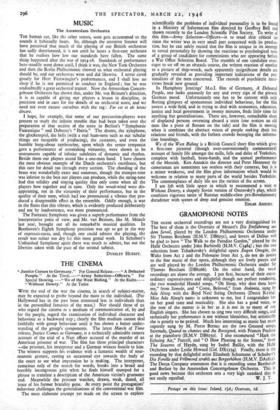MUSIC
The Amsterdam Orchestra
THE human ear, like the other senses, soon gets accustomed to the sounds it habitually hears. So, although the attentive listener will
have perceived that much of the playing of our British orchestras has sadly deteriorated, it is not until he hears a first-rate orchestra that he realises how low our standards have fallen. The same thing happened after the war of 1914-18. Standards of performance here steadily went down until, I think it was, the New York Orchestra and then the Berlin Philharmonic showed us what orchestral playing should be, and our orchestras went and did likewise. I never cared greatly for Herr Ftirtwangler's performances, and I shall lose no sleep if he is not permitted to conduct in England ; but he was
undoubtedly a great orchestral trainer. Now the Amsterdam Concert- gebouw Orchestra has shown that, under Mr. van Beinum's direction, it is as capable of giving our players a lesson in discipline, in precision and in care for the details of an orchestral score, and we need not even excuse ourselves with the tag: Far est et ab hoste docere.
I hope, for example, that some of our percussion-players were present to study the infinite trouble that had been taken over the preparation of that section of the score in Berlioz's " Symphonic Fantastique " and Debussy's " Iberia." The drums, the xylophone, the glockenspiel, the bells (with a real hum-note such as our tubular things are incapable of producing), the castanets, and even the humble bang-about tambourine, upon which the senior tympanist gave a performance of astonishing virtuosity, were shown to be instruments capable of infinite subtleties of dynamic and rhythm. Beside them our players sound like a one-man band. I have chosen the most obvious example of the Dutch orchestra's excellence, but this care for detail ran through every section. The chording of the brass was wonderfully exact and sonorous, though the trumpet-tone was inferior to the best our players can produce, while the string-tone had that solidity and singing quality that only come when all the players bow together and in tune. Only the wood-wind were dis- appointing, not in the virtuosity of their performance, but in the quality of their tone, which had too pronounced a vibrato that pro- duced a disagreeable effect in the ensemble. Oddly enough, it was in the flutes that this vibrato, which is evidently produced deliberately and not by inadvertence, was most pronounced.
The Fantastic Symphony was given a superb performance from the interpretative point of view, and Mr. van Beinum, like M. Munch last year, brought out all its remarkable musical qualities. In Beethoven's Eighth Symphony precision was apt to get in the way of expressiveness, and, though one could admire the playing, the result was rather too dry for this most genial work. In Schubert's Unfinished Symphony again there was much to admire, but not the liberties taken with the pace of the second subject.
DYNELEY HUSSEY.






























 Previous page
Previous page